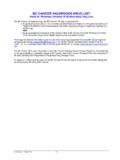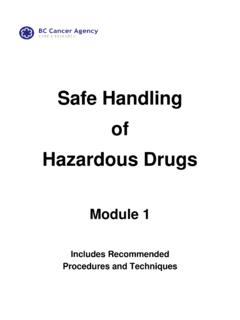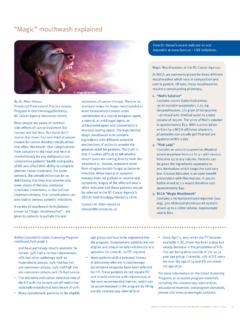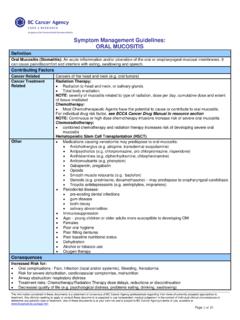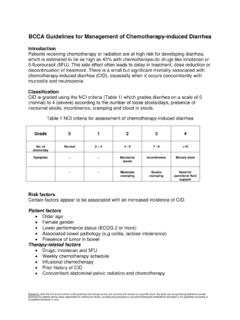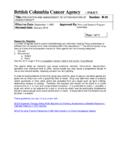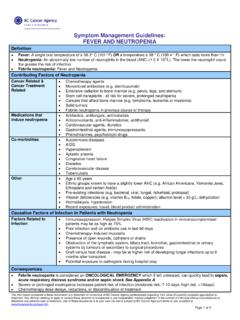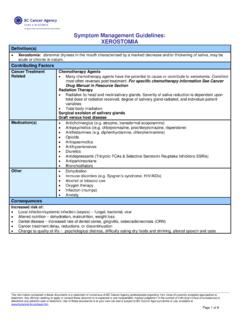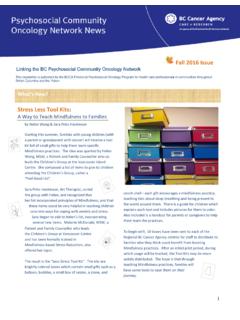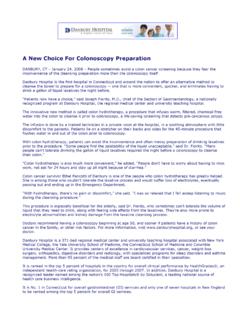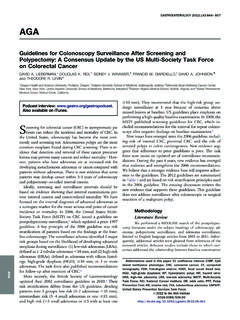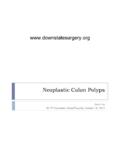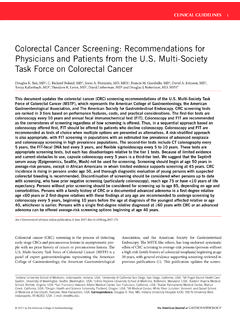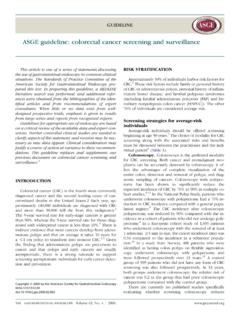Transcription of Colon Screening Program - BC Cancer
1 What you should know: Health care providers should complete the Colon Screening Program Colonoscopy Referral Form and fax it to the Program at 1-604-297-9340. For patients with a personal history of adenoma(s), please attach previous colonoscopy and pathology new provincial Colon Screening Program is an organized population-based Program aimed at reducing colorectal Cancer incidence and mortality in BC1,2, Screening ProgramFact Sheet for Health Care Providerscontact usColon Screening Program 801 686 West Broadway Vancouver, BC V5Z1G1ph: 1-877-70- Colon (26566) colonoscopy is recommended for individuals at higher than average risk for developing colorectal Cancer , defined as having one of the following: One first degree relative diagnosed with colorectal Cancer diagnosed under the age of 60; or, Two or more first degree relatives with colorectal Cancer diagnosed at any age; or, A personal history of adenoma(s).Higher than average risk - Screening colonoscopyFIT is recommended for average risk colorectal Cancer Screening .
2 The FIT yields approximately 88% sensitivity and 90% specificity for detecting colorectal cancer5. Furthermore, FIT is able to detect advanced adenomas with a sensitivity of approximately 55%5. There are also no dietary or medication restrictions for FIT which will assist uptake and test risk - fecal immunochemical test (FIT) Screening interval: FIT every two years for individuals at average you should know: Health care providers should complete the Standard Outpatient Lab Requisition (select Fecal occult blood, age 50-74, asymptomatic q2y) and instruct patients to take the form to a participating lab to pick up their FIT kit. Who is recommended for Screening ?The Screening TestsScreening is recommended for asymptomatic women and men ages 50 to 74 living in BC. The risk for developing colorectal Cancer increases substantially from age 50. There is little evidence that supports Screening outside the 50 to 74 age interval: Colonoscopy every five years for patients with family history of colorectal Cancer .
3 Colonoscopy in five years after a patient has low risk adenoma(s) identified. Colonoscopy in three years after a patient has high risk adenoma(s) Colon Screening Program is not recommended for the following individuals: Are up to date for Colon Screening : -FIT in the preceding two years or colonoscopy or flexible sigmoidoscopy in the preceding 10 years for average risk patients. -Colonoscopy in the preceding five years for patients at higher than average risk. Have a personal history of colorectal Cancer , ulcerative colitis or Crohn s disease. These patients should continue to obtain care through their specialist or health care provider. Currently have symptoms, rectal bleeding, persistent change in bowel habits, abdominal pain, unintentional weight loss or iron deficiency anemia. These patients should be referred to a specialist, no FIT required. Are on a definite surveillance plan through a specialist. Are in poor health - if a patient is not medically fit to undergo colonoscopy, then they should not undergo Screening ProgramFact Sheet for Health Care ProvidersPatient PathwayVersion: November 2013 References1.
4 Mandel JS et al. The effect of fecal occult-blood Screening on the incidence of colorectal Cancer . N Engl J Med (2000) 343 Mandel JS et al. Reducing mortality from colorectal Cancer by Screening for fecal occult blood. N Engl J Med 1993; 328 Hewitson P et al. Systematic review of colorectal Cancer Screening using the fecal occult blood test (Hemoccult): an update. Am J Gastroenterol 2008; 103(6) Zauber AG et al. Evaluating test strategies for colorectal Cancer Screening : a decision analysis for the Preventive Services Task Force. Ann Intern Med 2008;149(9) Levi Z et al. A quantitative immunochemical fecal occult blood test for colorectal neoplasia. Ann Intern Med 2007; 146:244-55. 6. Cole SR et al. A randomised trial of the impact of new faecal haemoglobin test technologies on population participation in Screening for colorectal Cancer . J Med Screen 2003; 10 Telford J. Effectively using the fecal immunochemical test. BCMJ 2013;55(7): visits health care provider2health care provider assesses eligibility1patient picks up from labPatient brings Standard Outpatient Lab Requisition to any BC public or private outpatient labs to obtain FIT completesat homeTest instructions included in each kit.
5 3patient drops off completed at lab Up to date with Colon Screening - patient should wait for next recommended interval Has a personal history of colorectal Cancer or have ulcerative colitis or Crohn s disease - patient should continue to obtain care through their specialist or health care providerhigher than average risk patient: colonoscopyas those having one of the following:colorectal Cancer under the age of 60; or,colorectal Cancer diagnosed at any age; or,A personal history of adenoma(s).1bc Cancer agency facilitates referral to patient s Health Authority Eligibility Complete Colon Screening Program Colonoscopy Referral Form and fax to BC Cancer Agency at 16042979340.* For patients with a personal history of adenomas, attach previous colonoscopy and pathology results sent to health care provider and bc Cancer agencyColonoscopy23colonoscopist performs colonoscopy on patient 4 eligible Asymptomatic women and men ages 50 to care provider assesses risk BC Cancer Agency sends results to patient and recalls patient for Screening in two Cancer Agency sends results to patientNOTE: Do not repeat FIT if positive.
6 All patients should proceed to an assessment for colonoscopy. Low risk adenoma: BC Cancer Agency recalls High risk adenoma: BC Cancer Agency recalls patient for colonoscopy in three or ibd detectedPatient is no longer followed by the Program . Colonoscopist arranges or refers back to health care provider for follow-up. normal / no adenomas foundBC Cancer Agency recalls average risk patient for FIT in 10 Cancer Agency recalls patients with family Symptomaticnot eligible health care provider receives colonoscopy results, pathology report and any recommendation for surveillance or follow-up patient coordinator completes pre-colonoscopy assessment with patient not eligible for colonoscopyPatient coordinator advises health care provider that colonoscopy is not proceeding. eligible for colonoscopyPatient coordinator books patient for colonoscopy. * Patients are registered in the Colon Screening Program by the use of the Standard Outpatient Lab Requisition (selecting the Fecal occult blood, age 50-74, asymptomatic q2y (copy to Colon Screening Program ) ) or the Colon Screening Program Colonoscopy Referral Program will refer your patient to the Health Authority for necessary follow up or recall them at the appropriate who do not have high risk characteristics as below should be referred for the fecal immunochemical test (FIT).
7 Complete Standard Outpatient Lab Requisition Form (select Fecal occult blood, age 50-74, asymptomatic q2y) and provide to patient.*

